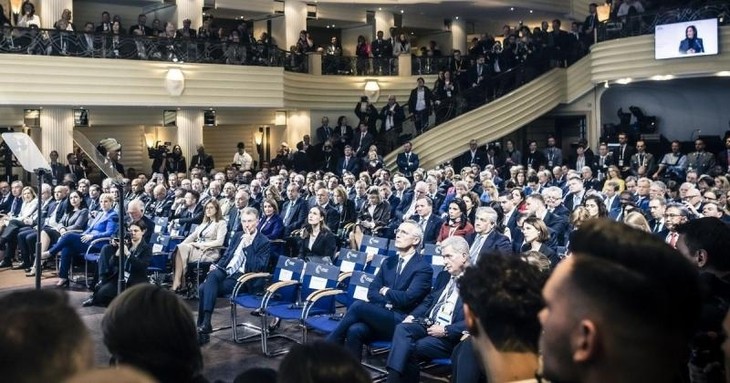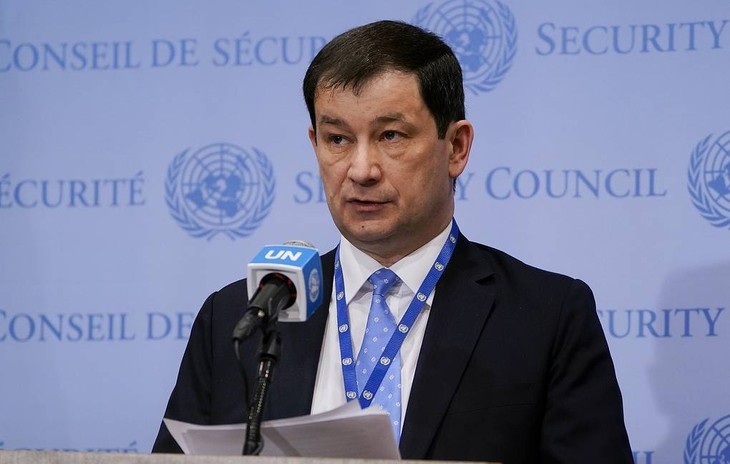(VOVWORLD) - On September 1, the world will commemorate the 85th anniversary of the outbreak of World War II, the most devastating war in human history. The commemoration takes place with world peace facing its most serious challenges since the end of the Cold War.
 The Munich Security Conference in March, 2024. (Photo: securityconference) The Munich Security Conference in March, 2024. (Photo: securityconference) |
Speaking at the Munich Security Conference last March, UN Secretary General Antonio Guterres said the world is at its most divided time in the past 75 years.
Risks of accelerating violence
Five months after the Munich Security Conference, the global peace and security picture remains gloomy. The two largest conflicts, in Ukraine and the Gaza Strip, continue to drag on with dangerous escalations and diplomatic deadlock. The Israel-Hamas conflict in the Gaza Strip is spreading across the region. Retaliatory attacks by Israel, Iran, and Hezbollah in Lebanon have crossed red lines honored by all sides for years and are threatening to explode into a full-scale war in the Middle East.
The civil war which broke out in Sudan last April has created the world’s worst humanitarian crisis. 54% of Sudan’s population of 50 million are facing famine and more than 10 million people have had to flee their home.
Risks of conflict are growing in West Africa and the Sahel region with the rise of branches of the self-proclaimed Islamic State terrorist movement, and the situation on the Korean Peninsula is becoming more threatening.
In the face of deteriorating global security, the UN Security Council convened a meeting on August 21 to discuss ways to prevent further conflicts.
Elizabeth Spehar, Assistant Secretary-General for Peacebuilding Support, to the Security Council on Peacebuilding and Sustaining Peace said that peace is the foundational goal of the United Nations and building and sustaining peace is central to the work of this Council and the Organization. "And yet, the number of conflicts is at a decades-long high, inflicting unimaginable suffering, devastating economies and robbing communities of their future.”
Despite skepticism about the ability of the UN or the UNSC to ensure global peace and security, the UN still plays a key role in building and implementing peace mechanisms.
In the Middle East, facing the risk of a full-scale conflict between Israel and Hezbollah in Lebanon, the UNSC on August 28extended the mandate of the UN Interim Force in Lebanon (UNFIL) for another year. This decision was supported by all UNSC members, including the five permanent members and members of the Security Council currently involved in conflicts.
 Dmitry Polyanskiy, Deputy Permanent Representative of Russia to the UN. (Photo: AP) Dmitry Polyanskiy, Deputy Permanent Representative of Russia to the UN. (Photo: AP) |
Dmitry Polyanskiy, Deputy Permanent Representative of Russia to the UN, said UNIFIL plays a crucial role in preventing parties in Israel and Lebanon from crossing the Blue Line, the demarcation line between Lebanon and Israel and the Golan Heights under a 2000 UN Resolution.
Challenges of resources
UN efforts to maintain global peace face many challenges. The return of strategic competition between major powers, similar to the Cold War period, has eroded the world order and reduced the effectiveness of many mechanisms.
UN agencies are facing growing financial difficulties. The UN is maintaining 11 peacekeeping missions around the world, with a total of 70,000 soldiers, police, and civil staff and a budget for the 2023-2024 fiscal year of nearly 5.6 billion USD.
This budget is 700 million USD less than the previous fiscal year and is considered insufficient for the peacekeeping missions. Three peace missions in Africa – South Sudan, Central African Republic, and Democratic Republic of Congo – account for more than 50% of this funding. Financial shortages have forced the UN to cut some special political missions.
On August 8, UN Under-Secretary-General and UN Women Executive Director, Sima Bahous, warned that that decision is destroying many of the peace achievements made over the past decades.
“The role of the Peacebuilding Fund is essential for this as is stronger collaboration with international financial institutions. In addition, all drawdowns should include plans to sufficiently allocate resources to women, peace and security work, to sustain gains made,” said Bahous.
Observers say the UN’s financial problems will not be resolved soon as this crisis has been growing for many years. Last year the UN budget had a deficit of 800 million USD.
Michael Moller, former Deputy Secretary General of the UN, said the world is fragmented, with many countries trying to solve problems unilaterally. The UN’s role, especially in politics, has been weakening. Many UN members, including world powers, have cut or delayed their annual financial contributions to the UN, making UN peacekeeping missions increasingly difficult to maintain.